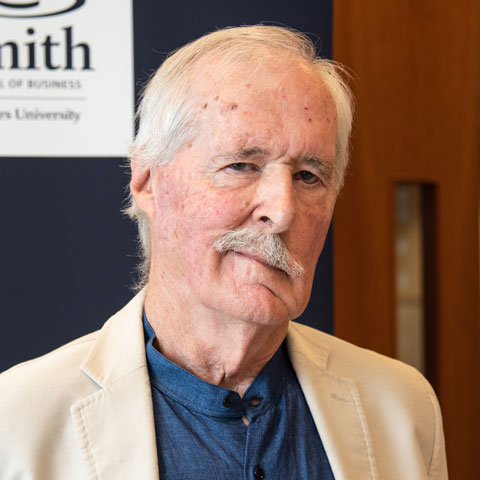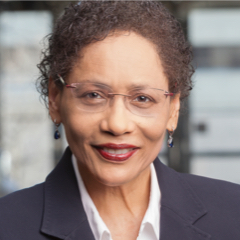Advancing New Knowledge in Business
From leadership to finance to social impact, Smith researchers are uncovering important insights to drive business and society forward.
Why do people commit fraud inside their companies? And what levers do firms have to deter such acts? These are questions that Pam Murphy, a researcher at Smith School of Business, delves into.
Murphy, associate professor and E. Marie Shantz Fellow of Accounting, has long been interested in fraud–why it happens and how companies can put a stop to it. “During my years working in the corporate world, I suspected instances of fraud several times. I watched with curiosity how it began and why,” she says. Though companies have for years tried to curb it, fraud still costs organizations around five per cent of revenues, according to the Association of Certified Fraud Examiners.
Murphy is currently researching “group fraud”, defined as two or more people working together on the crime. Murphy and several co-researchers are examining the mechanisms that encourage people to join a group fraud, as well as the factors that cause people not to join. As part of her research, Murphy interviewed convicted fraud felons in prison.
As it turns out, a company’s culture, levels of authority and goal-setting tied to performance measurement all affect the likelihood of group fraud, she says. Her research also finds that the absence of external controls, like regulatory inspection, external audits and external mentorship increase the likelihood of people joining a group fraud. However, when present, they help people resist joining.
“Management should think very carefully about how these controls are implemented, and especially how they are viewed by employees,” she says. “For example, do employees perceive organizational culture the way it is intended? How are goals set and how closely are employees measured against achievable versus non-achievable goals? Do employees have a level of authority appropriate for their level of responsibility, giving them the freedom to say no when they feel they have to?”
Watch Smith professor Pam Murphy discuss what motivates people to be honest in the workplace, and what managers should know about honest versus dishonest employees.
Murphy’s work has been published in top academic journals such as Accounting, Organizations and Society and the Journal of Business Ethics. She often speaks about fraud at conferences on accounting, investments and government. Her work exemplifies how research conducted at Smith can have real-world impacts for companies.
Smith researchers, in fact, are known worldwide for their expertise. During the 2019-2020 year, 44 articles by Smith faculty were published in academic journals, including 24 in the Financial Times’ 50 top-tier journals. The school’s faculty received more than $940,000 in research grants from funding agencies including the Social Sciences and Humanities Research Council and the Natural Sciences and Engineering Research Council of Canada.
Research done at Smith covers a number of important areas in business today. That includes leadership, entrepreneurship, digital innovation, analytics, artificial intelligence, social impact and accounting. Business ethics, corporate governance, finance, management information systems, marketing, operations management, organizational behaviour and strategy are other key areas.
Over the past year, several Smith faculty were recognized for their research excellence. Among them:
Paul Calluzzo, associate professor and Toller Family Fellow of Finance, was given the 2019 Best Paper Award by the journal Corporate Governance: An International Review. His paper explored clustered shareholder activism.
Monica LaBarge, assistant professor, won the 2020 Thomas C. Kinnear Award for outstanding article published within the past three years in the Journal of Public Policy and Marketing. Her paper looked at understanding food waste at each stage of the consumer decision-making process.
Tina Dacin, professor and Stephen J.R. Smith Chair of Organizational Behaviour, won a Responsible Research in Management Award from the International Association for Chinese Management Research for her research.
William Cooper, professor emeritus of organizational behaviour, won a Responsible Research in Management Award from the International Association for Chinese Management Research for his research.
Julian Barling, the Borden Chair of Leadership and professor of organizational behaviour, received the Distinguished University Professor Award from Queen’s, the university’s highest research-related honour.
Yolande Chan, E. Marie Shantz Professor of IT Management, was a recipient of Queen’s University’s 2019 Distinguished Service Awards and a winner of the 2019 Awards for Excellence in Graduate Student Supervision.
Watch Smith professor Yolande Chan talk about the role that intuition plays in strategic thinking within organizations, and the four different types of intuition that drive decision-making.
Smith faculty are widely quoted in the media for their expertise and contribute articles to major newspapers and publications, helping readers understand the implications of their research findings on day-to-day business operations. During the COVID-19 pandemic this past spring, Steven Salterio, professor and Stephen J.R. Smith Chair of Accounting and Auditing, wrote an article concluding that, based on the 1919 influenza pandemic, it could take two years for today’s economy to recover from coronavirus.
Meanwhile, faculty members Laura Rees, assistant professor of organizational behaviour and Tina Dacin explained the steps businesses needed to take to put customers and employees at ease as they reopened. The article was based on their research expertise.
So what drives researchers at Smith in their work? An insatiable curiosity to discover new knowledge, of course. Finding the answers to important business questions is another reason for their passion.
Take Jean-Baptiste Litrico’s research, for example. Litrico is Distinguished Faculty Fellow of Strategy at Smith. He’s also the director of the school’s Centre for Social Impact (at publication), and his research examines how organizations respond to the demands for social change and environmental protection.
“Ultimately I’m interested in better understanding how social and institutional change makes its way in organizations and industries,” he says. His research has been published in top-tier academic journals such as the Academy of Management Journal, Organization Studies and the Journal of Business Ethics.
One of his recent studies examined “social enterprises”, which are revenue-generating businesses launched by non-profits. Can non-profits operate these revenue-generating ventures while still achieving social gains? Or are they selling out?
Watch Smith professor Jean-Baptiste Litrico explain why we need to rethink traditional attitudes toward funding non-profits, and why it’s possible for non-profits to earn revenue while still doing social good.
Litrico and his study co-authors wanted to find out. They analyzed grant applications submitted by non-profits to a foundation that supports social enterprise projects. All in all, they studied 1,200 grant applications submitted over 14 years.
They discovered that, at first, many non-profits thought of their social enterprises mostly as a way to generate revenue that was separate from the non-profit’s regular activities. For instance, a museum might open a cafeteria to serve its patrons.
But since then, non-profits have learned to make money while achieving a social benefit at the same time. Examples include non-profits offering specialized services to their target beneficiaries, or those that provide employment opportunities to the disadvantaged populations they serve. The result, says Litrico, is that non-profits are now better at managing their revenue-earning versus social-mission goals and often find innovative ways to do both together.
The study of business is important, says Litrico, because “business organizations play a central role in our modern societies, and many of the critical societal and environmental issues we are facing today either emanate from organizations or at least are influenced by them. Thus, I think it’s important to better understand how they adopt new ways of organizing or managing work, and how they integrate demand for social benefits and environmental protection.”






